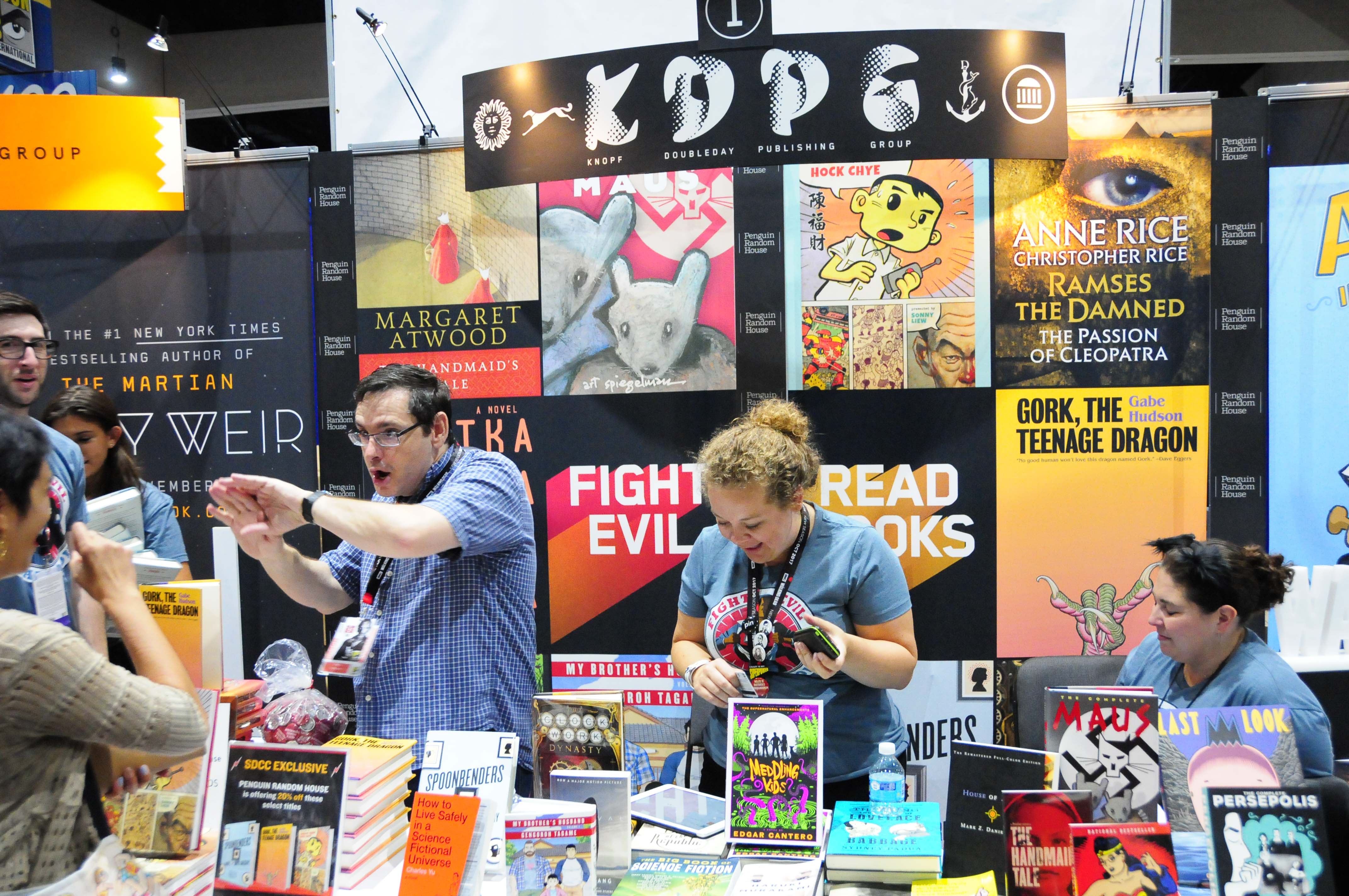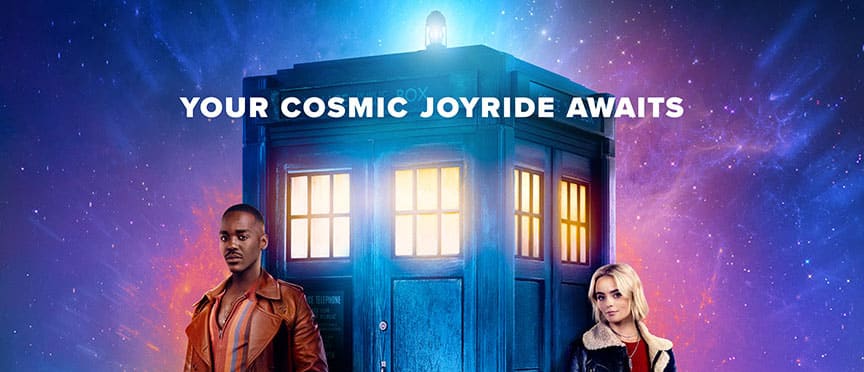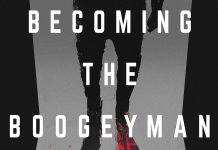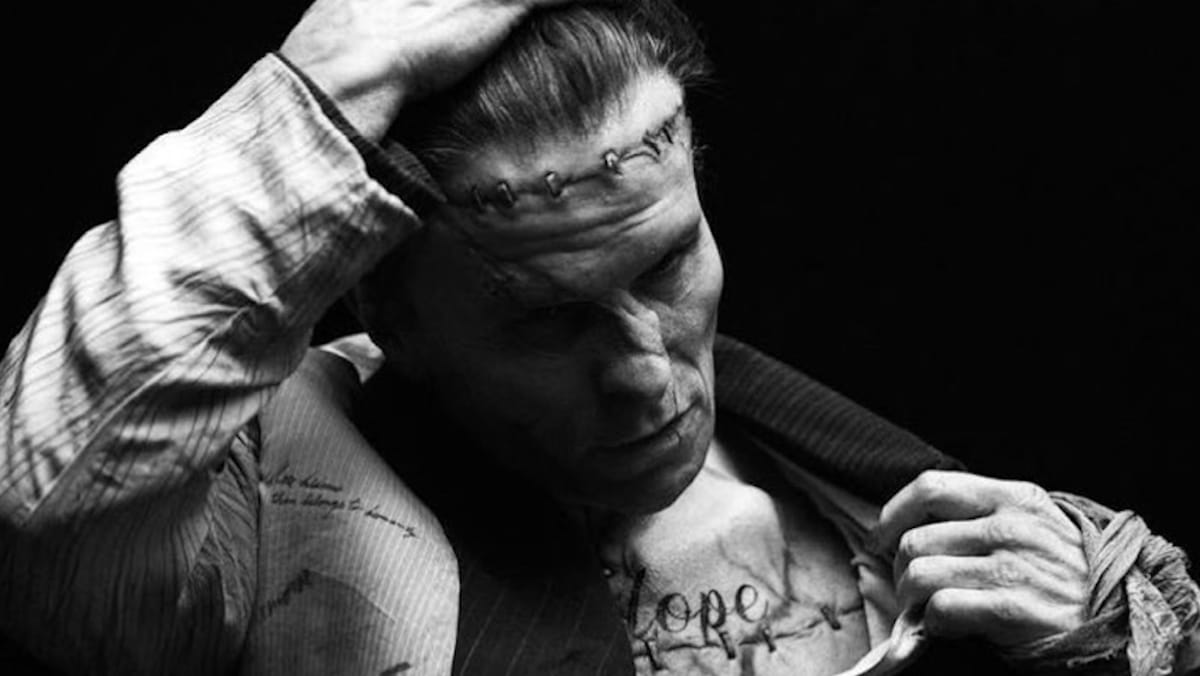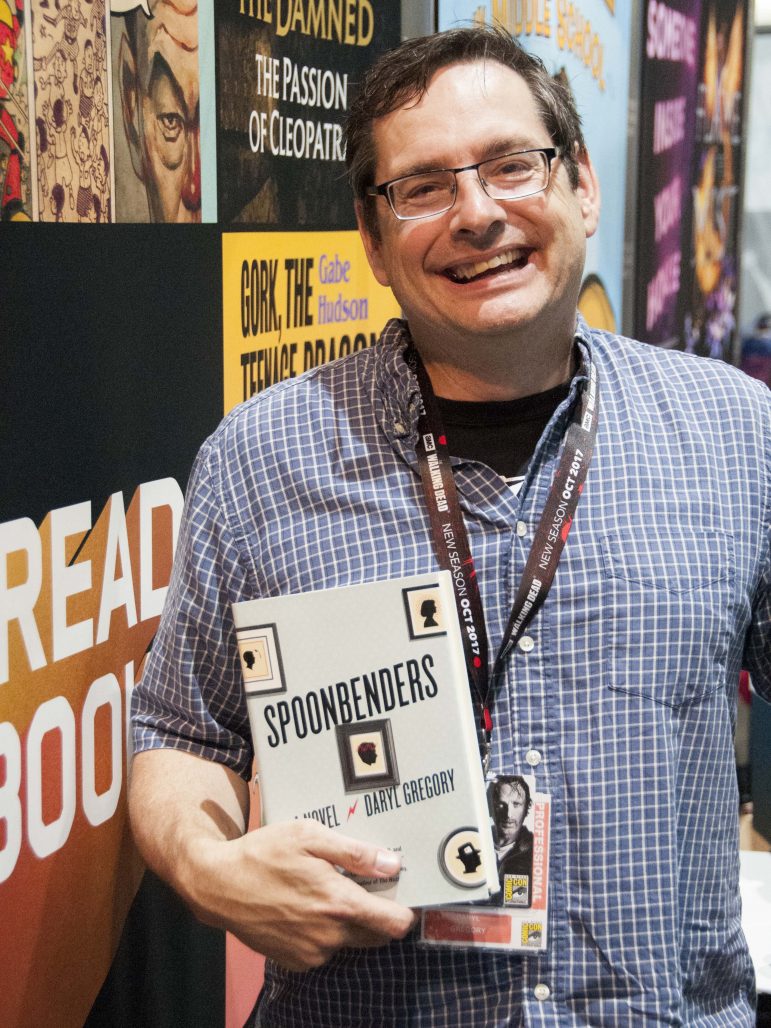
Fantasy author Daryl Gregory’s newest novel, Spoonbenders. centers around the Telemachus family in the very distant and backwards year of nineteen-ninety-five. The Chicagoan family are anything but normal as they were once known “The Amazing Telemachus Family,” regularly touring the country and appearing on television. Following an unfortunate T.V. appearance that marked them as frauds, the family members adapt to everyday life, always plagued by feelings of lose and memories of glory days behind them. It’s only when the family is faced with a threat they find their heydays are not forever gone and that they truly are “Amazing”.
At this year’s San Diego Comic-Con, I sat down with Daryl Gregory and about talked about his life and work.
–
Where did you get the idea come from for Spoonbenders?
It came from two things: I knew I wanted to write about families in my books. I had a really quiet family, but I grew up in Chicago and I would go on sleepovers and visit my friends’ families and they would be slamming doors and people would be yelling at each other. I thought, “This is amazing! I want to have a family like this.” They were so dramatic. So, I wanted to write about a big, Catholic, Chicago family like that. That was sort of the start of it and all the psychic stuff came in too. But also… I grew up as a Cubs fan and that was when the Cubs were terrible and sucked year, after year. I wanted to write about that feeling of mediocrity. It’s like, “Look, your heydays were way past you. They’re probably never coming again.” But, you just show up every day and do your job and you think about what use to happen. That’s the way I grew up. The Cubs were my religion. My world view was severely damaged by them winning the World Series, however. I think it was a terrible mistake. Also, someone in Denver once explained to me when I was at a stop at a bookstore, “You know, when the Cubs won, that triggered the alternate timeline that we’re living in right now. We’re living in a world where anyone can become president, when anything can happen.” So, it’s the Cubs winning that and breaking the universe that leads to everything happening right now.
How was the research for the book?
I was reading books on stage magic, a lot of books on mentalism, how stage magicians fake mental powers and all the different techniques that they use, and I was also reading James Randi’s books. James Randi was the magician who debunked Uri Geller. I was reading his book and how Uri Geller got a lot of his tricks across. I was also reading a lot about card sharks. One of the characters, Teddy Telemachus, knows he has no powers and is kind of a con-man, but he made his living as a mechanic working poker games. The techniques they use are nothing but short of magic; The preparation that they go into. Also, there was a lot of research I did about the US government. [The US government] funded “Project Stargate” up until nineteen-ninety-five, doing all this psychic research, and Project Stargate is an important part of Spoonbenders. In the book, they’re trying to recruit the family into it. All that stuff now, through the Freedom of Information Act, all the Project Stargate notes including the tests of Uri Geller are all online. You can see every document that they were keeping throughout the seventies about how they tested these psychics. That was, like, amazing.
Is that why the book s takes play in nineteen-ninety-five?
Exactly! That’s the year that congress cut off funding and I wanted to set the book in that year. I also wanted the people at the right ages so we could do the sixties, the start of the government research, and do the heyday of Uri Geller in the seventies, and then be twenty-years after that.
Do you believe in psychic power?
I have to confess that I don’t. I’m such a skeptic and a materialist. But, I did go to this “Quantum-Spoon Bending” seminar. Me and my girlfriend went and paid fifty-five dollars apiece to “learn the secrets of bending spoons,” and they show up and hand us forks. I was like “Wait a minute, this is supposed to be spoon bending, not fork bending.” Anyway, he showed us these techniques and they all worked, but the way that they worked was basically through the powers of suggestion. There’s sixteen-people in this circle, we’ve all got forks, people have their eyes closed, and I opened my eyes because I’m basically there as a spy. Across the circle from me, there’s a woman just bending the hell out of her fork. Eventually, we all open our eyes and the teacher said, “How did it go?”, and this one woman raises her hand and says, “Um, I don’t know. I just felt the warmth roll through me. This energy, the arcturian light, flowed through my body and look, I have this bent fork.” And then, it was game on. Everybody in the circle closed their eyes again and trying different techniques, and everyone is bending forks all around this circle. By the end of the two-and-a-half-hour seminar, people are getting so fast at bending the forks… They weren’t doing it insincerely, they weren’t trying to fool each other, but they wanted to participate. They wanted to feel special.
For Spoonbenders, I realized that this whole book is about this family that wants to feel special again, and I understand that feeling. So, it was a real important lesson for me. I learned about the way that stage magicians would fake bending spoons and the way that they prepare things, but I realized it’s a lot simpler than that. People want to participate and the only real energy that they were using was kinetic energy and maybe a lot of enthusiasm and optimism.
With Spoonbenders now being out, have you had any “Shucks, I should have put that in” moments?
Oh, I had a couple. One, there’s the little things in which as soon as the book is printed, you go through it and find mistakes. The French translator found an error that got into English and the German translator found an error too. I was like “We’ll just have to fix it in the next printing, guys.” They read it very carefully as they are translating it to be printed. Another thing was when I was talking to the screen writer, as they’re trying to make this into a television show, and I was talking to Nicole Beede, who’s writing this outline, and she was explaining to me how the first episode is going to break out. She came up with this great idea with compressing several events that happen over a couple years. She’s like, “You know, all these could happen in the same day.” I’m like, “Of course they could. Damnit!” I wanted to go back and do that. I thought it was just a beautiful idea. I think it’s going to be a great adaptation, if it ever gets to be a T.V. show. But you know, you mostly try not to look back because if you do, it will just go on and on, and I will just want to keep re-writing it.
If the show does come to be, are you going to have an active hand in it?
No, they haven’t talked about that yet. But probably the smart thing for me to do would be to stay away. We’ve talked about maybe writing an episode, but that’s their own art form and they’ve got to make it into their own story, to make it work for the screen, and I know they’re really good with that. I want their story to work. Maybe I will do something and maybe I will learn screenwriting, but they need to do what they do best. I just need to go on and write the next book. It’s probably the smartest thing for me to do.
What were your favorite books growing up?
Let’s see. Roger Zelazny… like every kid my age I was reading. J.R.R Tolkien, I got my mind blown in my Sophomore year of high-school when I read Jonathan Swift’s Gulliver’s Travels, cause I know it was supposed to be satire for adults, but I thought it was just an amazing book that I realized “Wow, you can pretty much do anything,” and things that I thought of as science-fiction were actually part of mainstream literature just really going back to the start of writing.
What have been your influences in your work?
My influences vary depending upon the book. For Spoonbenders, there were a bunch of different books that fed into it. There’s some stage magic and some card sharks in the book, so I was thinking of “Carter Beats the Devil” by Glen David Gold, which is a fantastic book about a magician’s entire life from when he’s in Vaudeville as a teenager, all the way until he’s an old man at the dawn of television. Then there was a lot of non-fiction by James Randy who was a stage magician who debunked people like faith healers and psychics. His books were really-influential. But for the large sense, there’s some people who are constant influences for me; Roger Zelazny, I’ve read most of Philip K. Dick, and John Crowley’s “Little Big” was a huge one. “Little Big” is about an extended family and they’re all vaguely magical. It’s the same kind of feeling of Spoonbenders, in that you’re not sure if they are really-magical or if they just believe they’re magical.
Why do you write fantasy?
Yeah, I feel like I had no notice. I mean, I feel like I was imprinted. For some reason, I was an English major and a Theatre major and so I’ve read the classics. Maybe this goes back to reading mythology stories when you’re a kid, but magic and the fantastic use to be a regular part of literature. It wasn’t considered a separate genre. The gods were involved, magic was involved; That was just a fact of the world. And so, I was always attracted to stories where something strange was going on, and I felt like when I started writing I didn’t want to leave any of that out. That gets me going, when there’s something actually-weird going on and it works as a metaphor at the same time. In Spoonbenders for example, one of the characters, Irene, she’s the human lie-detector. It makes her relationships impossible because she can hear the lies. Her son is Matty, who’s fourteen. Imagine the hell of having your mom be a human lie detector. Like, a lot of us think our mom has this power and they certainly want us to believe they have this power, so I really like that dynamic. There’s one point in the book where his mom says to Matty, “Have you been smoking pot?” He knows he can’t answer directly, so he answers in the form of a question. He says, “Currently?” Everybody in the family has learned to answer Irene in the form of a question and eventually she just yells at them, “Stop Trebeking me!” So, I like the absurd and the surreal, but ultimately I like to have it be psychologically realistic at its heart. It has to be meaningful for me at the emotional level or it doesn’t work.
You’ve done some graphic novels with Boom! Studios and IDW. How as that compared to writing for regular prose?
Yeah… I mean, I grew up on comics, and so I got into comics because I express jealousy in my friends who are doing them. Chris Roberson and Bill Willingham basically brought me in. Chris Roberson gave my first novel to Boom and said, “You might want to look at this guy.” I got to write with Kurt Busiek for my first comic and then do the “Planet of the Apes” series for a couple years… It was just fantastic. I love how it’s a whole different kind of writing. It’s very “visual-first.” I love working hand-in-hand with an artist. Like, that was amazing to do. My first love probably will always be novels, but I love the whole comic process, I love the whole collaborative part. It’s a lot less lonely than just sitting in a coffee shop for hours, and hours, and hours alone.
What is the next book?
I don’t know. Well, here’s what I do know. I have a young-adult series with the Tor team called the “Harrison Squared” series and I’m just working on book two write now, that’s almost done. There will be a book three down the road. But, the next adult novel is in such a weird amorphous stage. When I’m on a book tour, people always ask “What’s the next thing?” and I always feel like I’m coming out of the hospital with a new baby and they’re like “That’s a great baby. When’s your next baby? Are you going to do anything different with the next one?” I’m just trying to enjoy the moment, HAHA.


